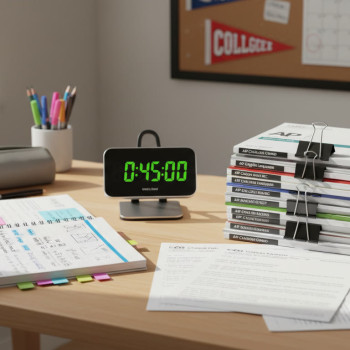Why this matters: AP in China Mainland — a note to parents
If your child is preparing for AP exams while living in China Mainland, you likely have questions that keep nudging you at odd hours: Where will they test? What rules are different? When do you need to register? And how can you give them the calm, steady support they need in these last busy months?
This guide walks you through the practical reality of AP testing in China Mainland — written for busy parents who want clarity, confidence, and an action plan. It blends what schools and test centers expect, the timeline you’ll need to follow, day-of logistics, and study strategies that actually work. Along the way, you’ll see where one-on-one, personalized help (such as Sparkl’s tailored tutoring, structured study plans, and AI-driven insights) can make a real difference in both preparedness and peace of mind.
How AP testing is organized in China Mainland — the big picture
The AP Program is global, but the way exams are administered can differ by country because of local regulations and operational partners. In China Mainland, schools and test centers operate under clear rules: many international schools and authorized AP sites administer exams directly, while some local schools are required to use designated test centers operated through partner organizations.
That means three practical realities for parents:
- Your child’s school may be able to administer AP exams on campus — or it may need to register students to test at a centralized test center.
- Not every school offers every AP subject; some exams are only available at specific test centers on specific dates.
- Registration timelines and procedures can be strict and vary depending on whether a student tests at their school or at a partner center.

Types of AP testing locations you’ll encounter
1. Authorized school test sites
Some international schools and AP-authorized schools in China Mainland administer exams to their enrolled students. These are often the most comfortable option — students test in a familiar building, with their own coordinator handling registration and communications. If your child attends a school like this, focus on the deadlines and any school-specific instructions they provide.
2. Designated test centers (external centers)
Certain schools, often those governed by local education authorities, must send students to designated external test centers. These centers follow a separate registration process and may have fixed subject offerings and seat limits. When your child uses one of these centers, you’ll need to coordinate directly (via the school or center) to confirm enrollment and logistics.
3. Prometric or regional partner centers
For operational reasons, some AP exams in China Mainland are administered by testing partners that run centralized locations. These centers have their own timelines and can require registration through the partner in addition to College Board enrollment steps. It’s essential to follow the partner’s instructions exactly to avoid missed registration windows.
Key policies parents should know (clear, actionable points)
- All AP Exams must be taken during the official administration windows; early testing is not permitted. There can be limited late-testing options for approved cases — but you must request these through the school or coordinator ahead of time.
- Students generally register through their school’s AP coordinator. If your child is homeschooled or attending a school that doesn’t administer exams, they’ll need to arrange testing at an alternate authorized school or center.
- Not every test site offers every AP subject. Verify which subjects are available at the chosen center well before registration.
- ID rules are strict. Students must present acceptable photo identification and follow center-specific ID policies. Check ID requirements months in advance to avoid last-minute issues.
- Special testing accommodations are possible, but the approval process takes time. If your child needs extended time or other accommodations, start the paperwork early in the school year.
Timelines — what to do and when (a parent-friendly calendar)
AP administration follows an annual rhythm. Below is a practical timeline to keep your family on track. Exact dates vary by year, and schools may have their own internal deadlines, so treat this as a reliable framework you can adapt.
| When | What to do | Why it matters |
|---|---|---|
| Summer (June–Aug) | Discuss AP choices; ensure your child has College Board account; plan course load. | Early decisions help avoid overload and allow time for any summer prep work. |
| Aug–Nov | Join class sections in My AP; indicate intent to take exams; discuss accommodations if needed. | Many schools require registration info by early fall; accommodations require lead time. |
| Sept–Nov | School submits AP Exam orders (often a November deadline). | Missed ordering deadlines can mean no seat or late fees. |
| Jan–Apr | Continue coursework; use AP Classroom resources; begin targeted review and practice exams. | This is the time to close knowledge gaps and build exam stamina. |
| Early May | AP exam weeks — arrive early on test day; follow center instructions closely. | Test-day logistics and calm matters as much as knowledge. |
| Summer (June–July) | Scores released; review score reports and explore college credit options. | Use scores to plan university credit and future course selection. |
Note on late testing and makeup exams
There can be very limited late testing windows for specific circumstances. These are not guaranteed and require prior approval by the AP coordinator and, sometimes, a testing partner. If something unexpected comes up — illness, travel, or other emergency — communicate immediately with the school coordinator so they can advise you on options.
Practical registration checklist for parents
Use this checklist as your “pre-flight” routine before the AP season begins:
- Confirm whether your child’s school administers AP exams or if they’ll test at an external center.
- Ask the school for the exact registration deadline and fee schedule — get it in writing or email.
- Ensure your child has a College Board account and has joined the correct My AP class section.
- Check available subjects at the testing site and match them to your child’s classes.
- Prepare acceptable ID and any documentation required by the center — photocopy and store backups.
- If you anticipate accommodations, start the approval process early in the school year.
- Plan travel and lodging if your chosen center is far from home; testing centers are strict about arrival times.
Day-of exam: what to expect and how to help your child
Test day is a microcosm of everything you and your child prepared for. Your role is to reduce friction: help them sleep well, eat a balanced breakfast, and arrive relaxed and on time. Practical tips:
- Pack in advance: photo ID, pencils, approved calculator (if required), water, and a small snack for breaks where allowed.
- Avoid last-minute cramming. Short review of key formulas or vocabulary is fine — but high-stress studying often does more harm than good.
- Talk through logistics the night before: where the center is, how long travel will take, and who to call if something goes wrong.
- Encourage pacing strategies during the test: mark tough questions and return to them, and keep an eye on time-per-section.

Preparing academically: study strategies that work (not just more hours)
Effective preparation blends knowledge, test skills, and exam practice. Here are parent-friendly study strategies that yield results:
- Quality over quantity: targeted study sessions (45–90 minutes) with focused goals beat marathon sessions that burn motivation.
- Practice with real past-style questions and timed practice exams to build pacing and familiarity with question formats.
- Active review beats passive rereading. Use flashcards, teach-back methods (have your child explain a concept to you), and practice essays under timed conditions.
- Mix in small, frequent review sessions for key formulas, timelines, and vocabulary to move information from short-term to long-term memory.
- Simulate test conditions periodically: full-length practice tests help with stamina and concentration.
When to consider personalized tutoring
Not every student needs a tutor; some thrive with class instruction and disciplined self-study. But personalized tutoring can provide outsized benefits when it’s targeted and strategic. Look for tutors who:
- Diagnose weaknesses with a diagnostic test and craft a tailored plan rather than using a one-size-fits-all schedule.
- Provide specific exam strategies (e.g., essay structure, formula sheet organization, time management) aligned to the AP rubric.
- Offer regular practice under timed conditions and detailed feedback.
Sparkl’s personalized tutoring, for example, can be an effective option — their 1-on-1 guidance, tailored study plans, and AI-driven insights help identify targeted weaknesses, close gaps efficiently, and build confidence as exam day approaches. For many families, that mix of human expertise and smart analytics speeds progress without adding stress.
Costs, fees, and refunds — what to expect
AP exams have fees, and schools or centers may add administrative costs. Policies for refunds and cancellations vary by school and center — so do these two things early:
- Ask your AP coordinator for a breakdown of fees and refund policies in writing.
- Understand deadlines for cancellations and any penalties for late changes.
Budgeting in advance prevents surprises. If travel is required to reach a center, include those costs (transportation, possible overnight stays) in your planning.
Special situations: homeschooled students, transfers, and scheduling conflicts
If your child is homeschooled or attends a school that doesn’t administer AP exams, they can register at an alternate authorized school or test center. That requires careful coordination — contact the potential test site early and confirm their policies for external students.
For students who change schools mid-year or move between regions, inform the new AP coordinator promptly. Academic records, My AP enrollment, and exam registrations may need to be updated to ensure scores are reported correctly to the right school and colleges.
After the exam: scores, credit, and next steps
AP scores are typically released in the summer. When scores arrive:
- Review the score report with your child honestly: celebrate strengths and use lower scores as an opportunity to identify growth areas.
- Contact prospective universities to understand how they accept AP credit — policies vary by institution and program.
- Use scores to plan future coursework. Strong AP results can shape college choices and course placements.
Common FAQs parents ask — concise answers
Q: Can my child take AP exams in China Mainland if they are not enrolled in an AP course?
A: Yes, often they can, but you must arrange testing at an authorized test center or school that accepts external students. Registration rules and fees vary by center.
Q: What if my child is sick on test day?
A: Contact the AP coordinator immediately. There are specific policies for illness and emergencies; documentation may be required for a possible late testing arrangement or refund.
Q: How far in advance should we start preparing?
A: Ideally, preparation is ongoing throughout the AP course. If time is limited, a focused 8–12 week plan with targeted practice and at least two full-length practice exams can improve performance significantly.
Final practical advice for parents
Be the steady presence: your calm, organized approach reduces stress more than any last-minute study trick. Keep communication open with the AP coordinator, verify deadlines in writing, and make logistics non-negotiable so your child can focus on learning.
If tailored academic support suits your child, look for personalized tutoring that assesses needs, focuses on high-impact areas, and provides regular feedback. Sparkl-style tutoring — mixing 1-on-1 coaching, tailored study plans, and data-informed insights — can be the kind of targeted support that turns nervous energy into confidence.
Closing — a parent’s short checklist to tuck in your pocket
- Confirm testing location and subject availability now.
- Verify registration deadlines and fee policies in writing.
- Ensure College Board account and My AP class section are set up.
- Prepare ID and accommodation paperwork early.
- Plan a study calendar with periodic full-length practice tests.
- Decide whether personalized tutoring makes sense and seek a tailored program if needed.
AP testing in China Mainland requires a little extra coordination — but with a calm plan, clear deadlines, and focused preparation, your child can walk into the exam room ready to show what they know. You don’t have to do it alone: steady parental support, good communication with your school, and targeted tutoring where appropriate will make this season manageable and even empowering.
Wishing your family clear timelines, confident students, and a smooth AP season ahead.
















No Comments
Leave a comment Cancel